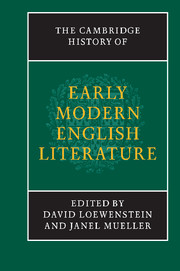Book contents
- Frontmatter
- Introduction
- 1 Modes and means of literary production, circulation and reception
- 2 The Tudor era from the Reformation to Elizabeth I
- 3 The era of Elizabeth and James VI
- 4 The earlier Stuart era
- 5 The Civil War and Commonwealth era
- Chronological outline of historical events and texts in Britain, 1528–1674, with list of selected manuscripts
- Select bibliography (primary and secondary sources)
- Index
- References
Introduction
Published online by Cambridge University Press: 28 March 2008
- Frontmatter
- Introduction
- 1 Modes and means of literary production, circulation and reception
- 2 The Tudor era from the Reformation to Elizabeth I
- 3 The era of Elizabeth and James VI
- 4 The earlier Stuart era
- 5 The Civil War and Commonwealth era
- Chronological outline of historical events and texts in Britain, 1528–1674, with list of selected manuscripts
- Select bibliography (primary and secondary sources)
- Index
- References
Summary
Following The Cambridge History of Medieval English Literature edited by David Wallace (1999), this collaborative volume of twenty-six chapters in five Parts narrates the history of English literature written in Britain between the Reformation and the Restoration. The Cambridge History of Early Modern English Literature takes account of significant recent discoveries and methodological developments in English literary studies, while providing the general coverage expected of a major critical reference work. We believe that there is a need for an innovatively conceived literary history that examines the interactions between sites of production, reception and circulation, on the one hand, and the aesthetic and generic features of early modern texts, on the other. Our volume provides basic information about and essential exposition of writing in early modern Britain, while exemplifying fresh approaches to the field and the writing of literary history. We hope that this volume, like the one devoted to medieval literature, will prove a valuable resource for scholarly, graduate and undergraduate readers, and that it will influence teaching and research in early modern English literature. We also believe that this Cambridge History differs from earlier literary histories in several notable ways.
Our volume is designed to implement what is, at present, a frequently shared working assumption of Anglo-American literary studies, but one that until now has not given shape to the compilation of a literary history. This assumption holds that literature is at once an agent and a product of its culture, simultaneously giving expression to and taking expression from the political, religious and social forces in which its own workings are imbricated.
- Type
- Chapter
- Information
- Publisher: Cambridge University PressPrint publication year: 2003
References
- 1
- Cited by



